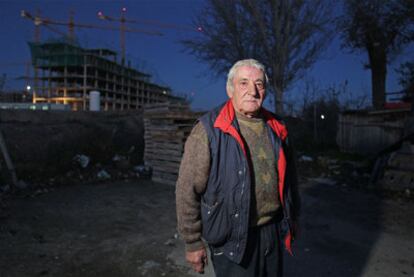Fidel's last stand: shanty dweller bows to the reign of cranes
But 70-year-old secures 70,000-euro compensation package before moving on
Fidel Serrano, 70, rummages around inside a suitcase in search of a press card from his old days as a photojournalist under Franco. He pulls out an old edition of Leon Tolstoy's Anna Karenina, fails to find the card, gets angry, slams the suitcase shut and puts it inside a van parked outside his shanty home.
The vehicle is packed. "I've started moving already. I'm leaving," he says, looking at the construction cranes that are helping build Los Molinos-Buenavista, a new suburb of Getafe, south of Madrid. Fidel, who has been living here for the last 30 years in the company of dogs, chickens and scrap iron, got 70,000 euros from authorities for agreeing to make way for the diggers. The land he is standing on will be used to build an electric substation that will feed power to the new homes.
"I don't know what will become of me inside an apartment"
Fidel has been resisting the move for months, but he recently reached an agreement with a consortium of regional and local authorities who will pay him 70,000 euros in compensation for moving off the public land where he settled decades ago. The consortium also agreed to pay a further 3,000 euros to cover moving costs, and to help Serrano find a subsidized home. The money was to change hands after his slum home was due to be razed last Thursday.
So does this mean that Fidel will sooner or later have a real home? "Yes," says the planning commissioner of Getafe, José Manuel Vázquez. "In a couple of months there will be a subsidized apartment available at the rental price and on his terms - near his old home and on the ground floor." Fidel is not a great friend of elevators.
But until that happens, Serrano is going to stay at a friend's shanty home near the Getafe cemetery. He is not taking his animals with him, and is instead giving them away to his neighbors. "I'm not going to put them in an apartment after this," he reflects, shortly after shaving with a razor blade over a washbowl by the light of a candle. His shanty home has no bathroom and no running water.
Fidel's resistance is not the only obstacle that constructors have had to overcome. A colonel from the nearby military airbase asked the builders of these 6,000 homes, in writing, to reduce the cranes' height because they were infringing on their airspace. The letter suggested the military were willing to take the matter to court. Getafe Mayor Pedro Castro replied with a private report commissioned by the consortium, which asserts that the construction work does not hinder takeoff or landing.
Meanwhile, Fidel Serrano is already saying goodbye. "I feel sad. I've been here half my life, out in the open, which is what I like. I don't know what will become of me inside an apartment; we'll see if I can get used to it," he says, putting on his beret. His neighbor has let the greyhounds out for a run among the forest of cranes. "I'm going to miss him. A lot. I'll go see him every time..." Fidel stops talking because he has a lump in his throat.

Tu suscripción se está usando en otro dispositivo
¿Quieres añadir otro usuario a tu suscripción?
Si continúas leyendo en este dispositivo, no se podrá leer en el otro.
FlechaTu suscripción se está usando en otro dispositivo y solo puedes acceder a EL PAÍS desde un dispositivo a la vez.
Si quieres compartir tu cuenta, cambia tu suscripción a la modalidad Premium, así podrás añadir otro usuario. Cada uno accederá con su propia cuenta de email, lo que os permitirá personalizar vuestra experiencia en EL PAÍS.
¿Tienes una suscripción de empresa? Accede aquí para contratar más cuentas.
En el caso de no saber quién está usando tu cuenta, te recomendamos cambiar tu contraseña aquí.
Si decides continuar compartiendo tu cuenta, este mensaje se mostrará en tu dispositivo y en el de la otra persona que está usando tu cuenta de forma indefinida, afectando a tu experiencia de lectura. Puedes consultar aquí los términos y condiciones de la suscripción digital.




























































